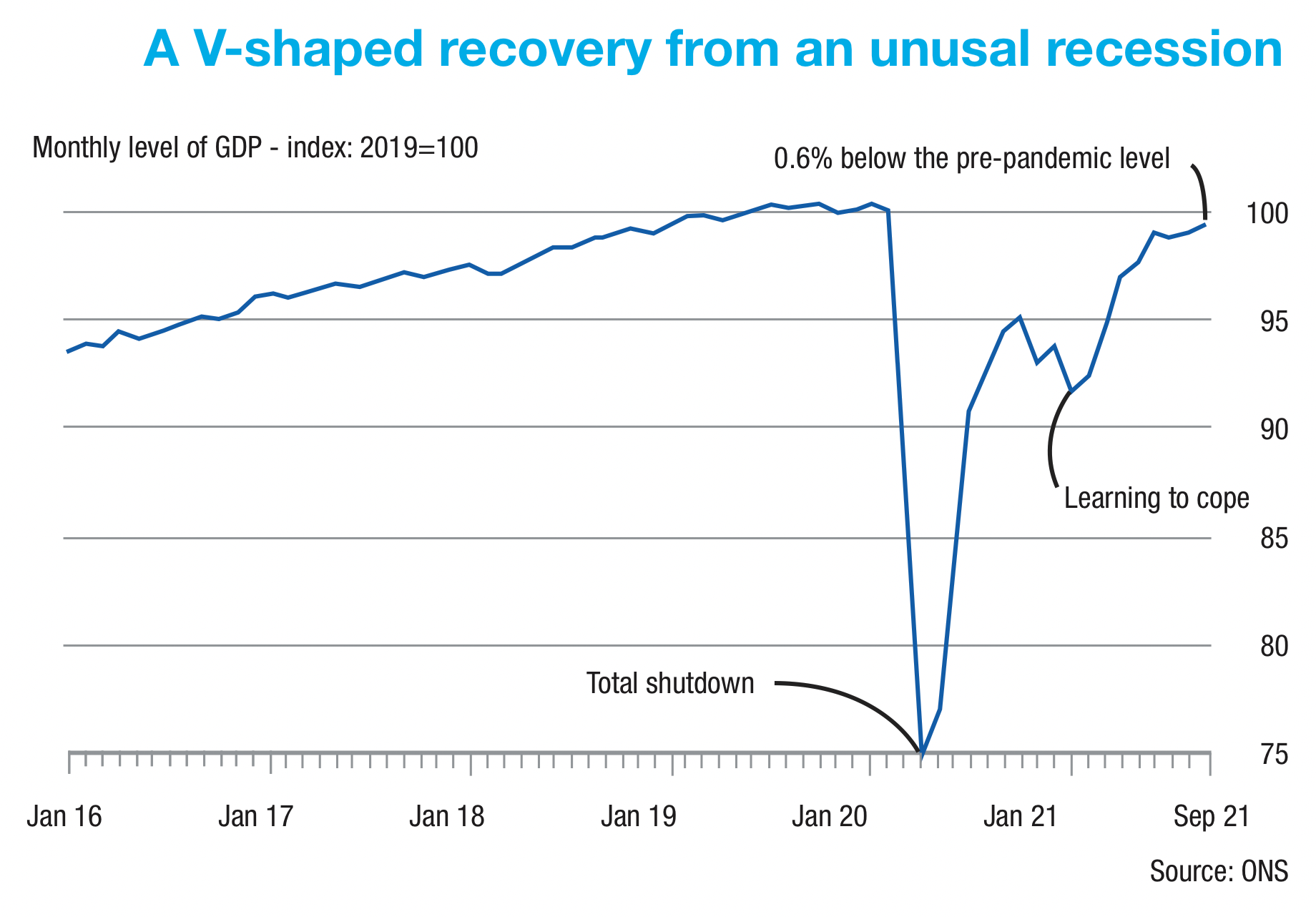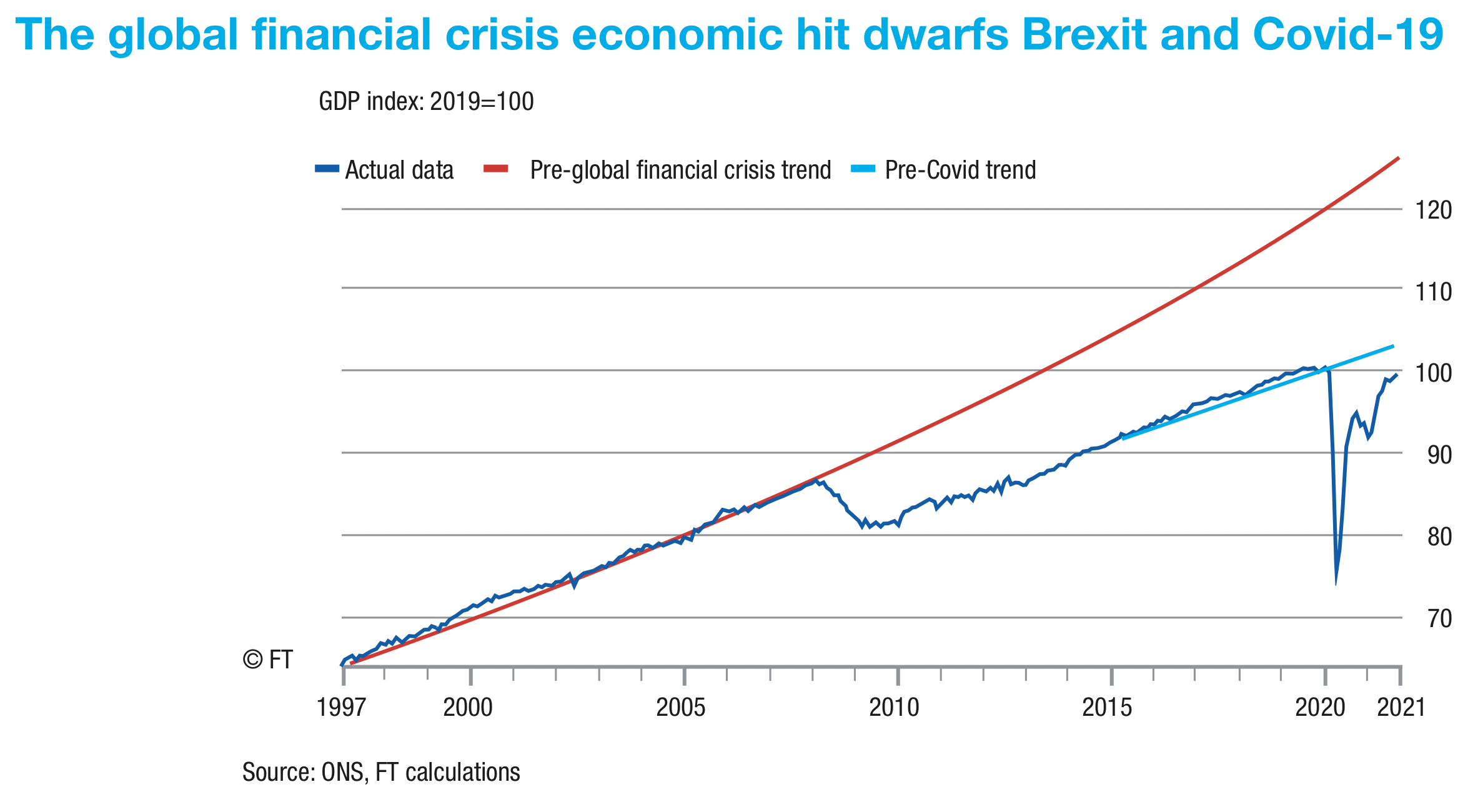Brexit loss could dwarf climate cost and Covid impact

Brexit, rather than Covid-19, is the primary headwind facing the UK economy, according to Economics Editor of the Financial Times, Chris Giles.
“The UK economy is in a much better place than had been expected even a year ago,” explains Giles.
The FT’s Economics Editor was speaking at the 26th annual Northern Ireland Economic Conference in December 2021 and highlighted that a loss of 3 per cent of the economy in the second wave of Covid, compared to a 25 per cent loss in April 2020, shows that the UK economy has learnt to mitigate the pandemic, and lockdowns in particular.
Latest data shows that the UK economy was only 0.6 per cent below pre-pandemic levels in September 2021, a significant difference than the over 4 per cent drop predicted by the Office for Budget Responsibility (OBR) in November 2020 and the over 3 per cent drop predicted in March 2021.
Giles explains that a swifter recovery than expected is in large part due to the vaccination programme and the ability to open up the economy faster than originally expected. However, he urges caution in the high uncertainty of current figures, stating that the ONS is currently trying to reconcile the disparity between other economic measurement methods which outline a 3 per cent fall in incomes from pre-pandemic level and an over one per cent drop in output, over the quarter.
It is for this reason that he also urges caution when comparing international economies. However, current best available statistics show that the UK economy is performing similar to its counterparts, including Canada, Italy and Germany, but less well than France and the US.
A notable consequence of improved economic circumstances beyond expectation is inflation and in December 2020, UK inflation jumped to 5.4 per cent, its highest rate in 30 years, meaning a squeeze on household incomes and a deepening of the cost-of-living crisis.
Interestingly, the UK as a whole shares a similar picture as in Northern Ireland, where there are now more pay-rolled employees than pre-pandemic, meaning a tight labour market and again reflecting a much better position than expected. The current UK unemployment rate of around 4 per cent is significantly lower than the 10-15 per cent rate predicted at the start of the pandemic.
“This pandemic has not been an employment story at all,” states Giles.
However, looking under the headline figures, Giles points to an “extremely unusual spread” between the performance of different sectors. The Economics Editor says that some sectors falling by 75 per cent while others rise by 20-30 per cent over a period of 18 months is unique.
These different impacts on productivity have led to various data spikes but, as a whole, the UK is close to its pre-pandemic productivity trend. A major reason for this is the level of government borrowing to insure businesses and households against the pandemic, the largest level of public borrowing in any time since the world wars.
Brexit
While Giles admits that it is still early days when assessing the long-term effect of both Covid-19 and Brexit, he highlights the widening of the gap between the eurozone and US economies, which existed at the point of the referendum.
“What we can say so far is that Brexit does appear to be having a detrimental impact on the UK economy,” states Giles. “Something like 2-3 per cent would be a reasonable estimate of the effect on the UK economy of a Brexit hit, compared to where we might otherwise have expected to be, had the referendum gone in the other direction.”
Giles highlights that the impact of Brexit is particularly evident in trade figures, where UK exports have lagged other countries. Similarly, while exports, particularly of goods, have done extremely well around the world this year, UK exports have “not joined the party”. “Our share of world exports has pretty much fallen along the line with estimates as predicted by the OBR in 2016 after the referendum,” he says.
Giles says that at the moment there is no reason to doubt the long-term estimate of a 4 per cent hit from Brexit for the UK economy, stressing that this does not mean a 4 per cent reduction but that the UK will forgo 4 per cent of economic activity it might otherwise have had.
Net zero
The 4 per cent is extremely significant when considering the huge amount of investment which will be required if the UK is to reach its ambition of net zero emissions over the next 30 years. The Climate Change Commission estimates that the UK will require about £50 billion a year of investment given that upfront investment in green energy offers a return, the CCC offers an estimated net cost of around 0.5 per cent of national income (£11-12 billion) per year.
“This is a reasonable burden, but it is worth noting that the 0.5 per cent is significantly less than the 3-4 per cent missed as a result of Brexit,” says Giles.
Prospects
Looking to the future, Giles believes that scope for rapid growth of the economy still exists, particularly in relation to consumption growth, given that levels of household savings remain very high. He acknowledges that a return to pre-global financial crisis is out of the question but adds: “We might get on a better trend than the pre-pandemic path and that is a reasonable hope for the UK looking forward.”







